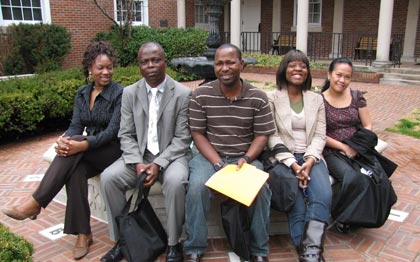Born into a family of eight children, the Rev. Joao Filimone Sambo knew from an early age what it meant to be poor.
"You lack food, health, shelter, education, clothing, friends and even an advocate to be your voice, your ear, your shoulder, your hand and foot," he said.
With the help of his mother and "God's grace," he was able to escape the war atrocities of his rural hometown in the Panda District of Mozambique. To keep him safe, his mother sent him to live with his aunt in Maputo more than 300 miles away.
That decision would shape his future.
As a devoted member of The United Methodist Church, his aunt connected him with now retired Bishop Joao Somane Machado. To help ease his aunt's burden — she was housing many of her relatives' children at the time — Machado offered to take in Sambo.
"I told her, it is OK, I can stay/live with the pastor's family, provided they send me to school," Sambo said. "When I came to Maputo fleeing from civil war, I was already four years out of school because of the political unrest."
With the help of Machado, Sambo completed his studies from fifth grade through high school. He then answered his calling to pastoral ministry at Africa University's School of Theology (2004 to 2007) in Zimbabwe and went on to Candler School of Theology in Atlanta.
 |
"The quality education I got at Africa University and later at Candler School has skilled and empowered me to serve," he said, "and that same education is consistent with my personal experience and desire."
After graduation, Sambo returned to Mozambique for an appointment at Cambine Theological Seminary. He then moved to Liberdade United Methodist Church in the suburbs of Maputo, where he served until late 2015.
"Having lived, (been) raised and gone through this kind of life experiences, when it comes for assisting the needy, the marginalized, those whose voices are mute, those who are politically, socially and economically vulnerable, those in the periphery of the periphery, I identify myself with them. I see them as my parish/flock to serve and feel that God has called me to serve them," Sambo said.
His teachings at Africa University have prepared him well for his current role as relief coordinator for the Mozambique Episcopal Area, which is still feeling the effects of a prolonged drought that has led to an economic crisis in the country.
"When I get to a community (mainly rural) and see how deprived God's children are, I feel that they need someone who can advocate for them, who can heal their wounds and wipe their tears off. Someone who can, if need be, fast, pray and run all kinds of risks on the roads and bushes to make sure food or clothes, school supplies or mosquito nets gets to them."
Sambo said his passion and inspiration come from Jesus' words toward the end of His Sermon on the Mountain: "…Truly I tell you, just as you did it to one of the least of these who are members of my family, you did it to me" (Matthew 25:40).
"The least of these (my interpretation) are the needy, the outcast, the marginalized, the hungry, the sick, the voiceless, the vulnerable, the children, the youths, the single parents, the disabled, the elderly. About these, I am very much passionate. I personally identify myself with them, and if God would allow and grant me means and powers within the life span He has set for me, I would really love to serve them, anywhere and anytime."
Julie Dwyer, general church content editor, United Methodist Communications
One of seven apportioned giving opportunities of The United Methodist Church, the Africa University Fund transforms Africa by educating and empowering students from across the continent through Africa University, the first fully accredited, United Methodist-related educational institution on the continent. The Africa University Fund supports the general operating expenses of Africa University including faculty and staff salaries and vital infrastructure. Please encourage your leaders and congregations to support the Africa University Fund at 100 percent.





